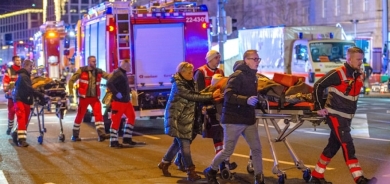Iran mourners mark 40 days since Amini’s death

Mourners made their way to the cemetery in the Kurdish city of Saqez, despite the heavy security presence and road blocks. Wednesday marked the end of the mourning period in Islam, with 40 days since her death.
Mourners have gathered outside the grave of Jina Mahsa Amini, whose death sparked nationwide protests, as Wednesday marked the end of the traditional mourning period in Islam.
Demonstrators reportedly made their way to the grave in the city of Saqez in Kurdistan province on foot, after Iranian security forces blocked the routes leading to the city. Others used their vehicles to navigate alternative routes.
Riot police was heavily deployed to the city, in anticipation of the protests, the Reuters news agency reported.
"They tried to stop us from entering the cemetery ... but I managed to get in. I have not seen Mahsa's parents yet," one witness near the cemetery told Reuters.
Dozens of mourners chanted "woman, life, freedom" and "death to the dictator" in the Aichi cemetery, the French news agency AFP reported, citing videos shared online.
Meanwhile, businesses in Saqez, and other Kurdish cities like Sanandaj, Divandarreh, Marivan and Kamyaran went on strike on Wednesday, the local Hengaw human rights organization said.
Reuters news agency reported another strike at a Tehran refinery, citing local activists. Refinery officials however denied the strike to the news agency.
On Tuesday, students protested at multiple universities across Iran, defying a crackdown as tensions mounted on the eve of the planned events to mark 40 days since Amini's death.
Authorities closed schools and universities in Kurdistan province on Wednesday, citing a "wave of influenza," state media reported.
Activists said on social media that protests around Tehran's medical school on Wednesday turned violent, when security forces used tear gas to disperse protesters.
How the authorities tried to prevent the protest
Iran’s state news agency published a purported statement by Amini’s family claiming that they would refrain from holding a ceremony to mark the 40th day "considering the circumstances and in order to avoid any unfortunate problem."
However, Iranian activists said the family came amid pressure by security services, AFP reported. They added that security services threatened the family with "their son's life" should they hold any ceremonies near their daughter's grave in Kurdistan province.
The mass protests against Iran's authoritarian government were triggered by the death of the 22-year-old Iranian Kurdish woman while in police custody in mid-September. The morality police had arrested her for allegedly not complying with a headscarf mandate.
Since her death, young women and schoolgirls have been at the forefront of the protests.
rmt/es (AFP, Reuters)
DW














